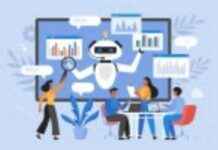As artificial intelligence continues to revolutionize the way we work, it’s important to consider the impact it may have on our careers. While AI tools offer incredible efficiency and convenience, there is a growing concern that we may become too reliant on them, leading to a potential erosion of essential human skills.
Imagine a scenario where a colleague presents a brilliant analysis in a meeting, thanks to the help of AI tools. While the efficiency is commendable, it raises the question of whether we are allowing AI to do too much of our thinking for us. The temptation to rely on AI-powered shortcuts is strong, as these tools promise to handle tedious tasks with precision. However, this convenience may come at a cost.
When we consistently delegate cognitive tasks to AI, we risk weakening the skills that set us apart in the workplace. Just as calculators have made mental arithmetic less common, AI tools have the potential to impact critical thinking and problem-solving abilities. It’s essential to recognize that the real danger lies in losing our ability to function effectively without relying on AI.
While AI can handle a wide range of tasks, there are certain human skills that remain irreplaceable. Skills such as reading a room during negotiations, empathizing with others, and creative problem-solving are uniquely human traits that AI can complement but not fully replicate. Successful professionals in the AI era will be those who understand when to leverage technology and when to rely on their human capabilities.
To thrive in an automated workplace, it’s crucial to use AI tools strategically while actively developing our human skills. By challenging ourselves to solve problems without AI assistance, maintaining strong interpersonal skills, and honing our judgment through experience, we can ensure that we remain valuable contributors in the workforce. The key is to view AI as a powerful tool that enhances our abilities rather than replaces them.
As we navigate the evolving landscape of AI in the workplace, it’s important to strike a balance between embracing technological advancements and preserving our unique human capabilities. By maintaining a proactive approach to skill development and viewing AI as a tool to enhance our expertise, we can stay intellectually engaged and professionally sharp in an increasingly automated world. Ultimately, the goal is not to resist AI but to use it wisely to maximize our potential and remain competitive in our careers.













